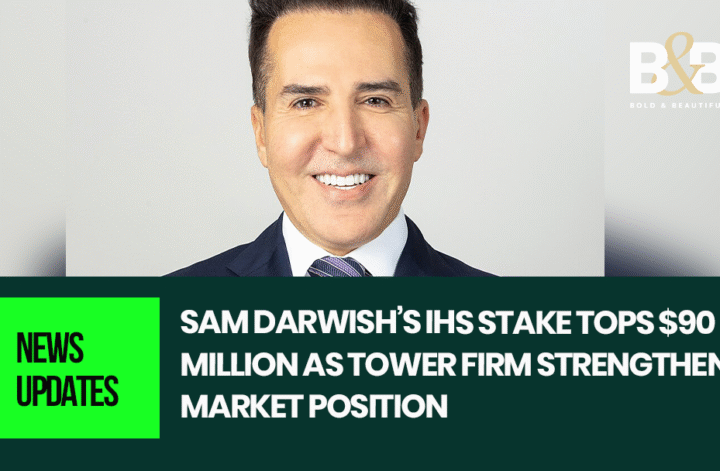Sam Darwish, the U.S.-Nigerian executive who built IHS from a regional tower operator into a publicly traded infrastructure business, has seen the market value of his stake in IHS climb above $90 million. The milestone reflects renewed investor appetite for telecom infrastructure assets and highlights Darwish’s continuing role in shaping the continent’s digital backbone.
Darwish founded the company in Lagos in 2001 and has guided its rapid expansion across Africa and into Latin America. Under his leadership, IHS grew through a series of sale-and-leaseback deals and acquisitions, and listed in New York in October 2021. The company now operates tens of thousands of towers and sells co-location and connectivity services to mobile operators across multiple markets.

The value of Darwish’s holding rose as IHS shares responded to improved operational updates and a clearer path to margin expansion. For a founder-executive whose reputation is tied to the firm’s network build-out and capital raises, the increase in stake value is a practical marker of investor confidence in long-term recurring revenue from tower assets.
IHS’s business model benefits from stable cash flows and high switching costs for customers, characteristics that appeal to infrastructure-focused investors. Recent demand for data capacity in Africa and expanded fibre and small cell projects in Latin America have reinforced the case for rooftop and tower owners. Those secular trends translated into firmer trading in IHS shares, and that in turn lifted the notional value of significant insider positions.
For Darwish personally, the development is not merely financial. It underlines his successful transition from regional telecom specialist to global infrastructure boss. He remains closely associated with the company’s strategic moves, from acquisitions to energy efficiency programmes for remote sites, and the market’s reappraisal of those initiatives is visible in the balance sheet of insiders.

The move also matters for Nigeria’s broader narrative about homegrown entrepreneurs scaling globally. Darwish’s profile sits alongside other African executives who have taken locally incubated businesses to international markets, proving a roadmap for future founders who aim to combine local scale with institutional capital.
Investors will watch whether IHS can sustain the momentum. The company faces execution risk in integration and operational areas, and macro factors such as currency volatility and interest rate trends remain relevant. For now, market valuations place a premium on predictable infrastructure cash flows and on management teams with a track record of delivery.
Darwish’s rising stake value is likely to sharpen debate among analysts about the best path forward for IHS: accelerate expansion through leveraged growth or consolidate margins and cash returns for shareholders. Either route will demand close board and executive coordination, and Darwish’s role at the centre of those debates is clear.
For stakeholders in African telecom and infrastructure, the takeaway is practical. The value re-rating of IHS underscores the steady commercialisation of digital infrastructure on the continent. For founders, operators and domestic investors, the episode shows how patient capital and disciplined execution can transform local businesses into assets of global interest.





